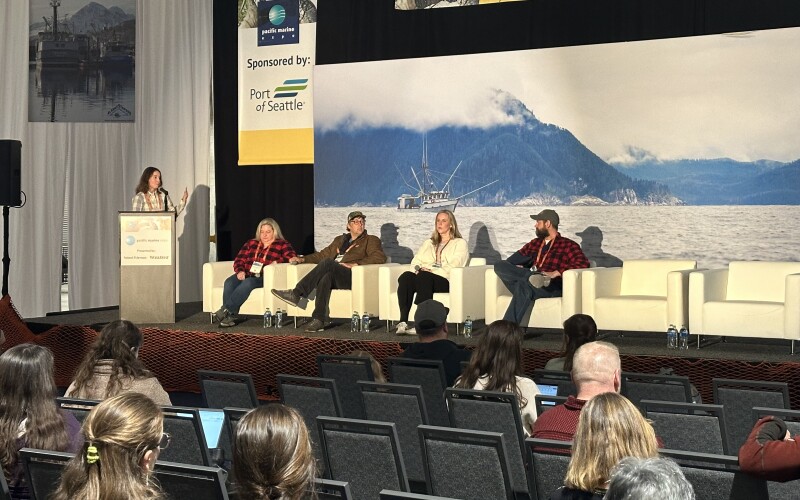On day two of the Pacific Marine Expo, a panel of industry experts came together to discuss strategies for addressing commercial fishermen’s mental health. Many commercial fishermen and industry professionals listened in on this critical matter.
Leann Fay, executive director of the Alaska Marine Safety Association (AMSEA), Leann moderated the Mental Health for Commercial Fishermen: Strategies for Addressing Stress on the Water session while a panel spoke about dealing with mental health on and off the boat.
“In general, in commercial fishing, fatalities have been on the decline, however, fatalities linked to mental health have been on the rise. Fishermen are twice as likely to experience excessive trauma and stress than other industries.” Shares, Faye.
“All can relate to stressors in life, and it’s something we can all connect on.”
In the United States, suicide rates for commercial fishermen are more than double the national average in workforce fatalities. Generations of fishermen have indirectly dealt with mental health challenges, but the new generation wants and needs to see these issues explored in a much more direct manner.
It’s no secret that commercial fishermen endure longer working hours in unpredictable conditions than the average person. According to AMSEA, social isolation and hard manual labor place these individuals at an elevated risk of abusing alcohol and painkillers or developing an opioid addiction.
One of the panelists, Marissa Baker, an assistant professor at the University of Washington, said “vessel captains or owners should start the conversation to normalize talking about not being 100 percent all the time. There needs to be training around mental health and not just around broken bones. This will help promote acknowledging mental health issues.”
According to the National Institute on Drug Abuse, mental illnesses often accompany substance use disorders, and for many people, drug and alcohol problems stem from self-medication or chronic mental health problems that oftentimes, people don’t know they have.
One of the panelists, Denise Damewood, is founder of Project Gabe, a resource for harm reduction, providing opioid misuse awareness, education, and recovery tools. She is also a public health nurse in Sitka and created Project Gabe in honor of her son Gabe Johnston, who passed away from an opioid overdose in January 2022. In the discussion, she spoke about daily approaches to stressors.
“Chronic pain is a stressor," said Damewod. "When we go to work, we can’t just leave physical pain at home. When it comes to commercial fishing it’s even longer hours with even tougher work, and those physical pains are often escalated.”
The commercial fishing industry across the country echoes the struggle of opioid addiction and the connection to mental health issues. With a younger generation of fishermen entering the workforce, this is something that these industry professionals are not ignoring. Stress has always been a prominent factor in working as a commercial fisherman. Stressors include finances, crew competency, weather, boat problems, lack of sleep, chronic pain, and trauma.
Damewood shared her story behind Project Gabe with National Fisherman back in July, saying “it is important to put aside old stigmas regarding ‘druggie addictions’ and ‘mental health weaknesses’ and realize the strong do get hurt and can become addicted to harmful substances like everyone else.”
Not only do commercial fishermen need to make sure that their trip catch will suffice for bait, fuel, and maintenance costs, but they also need to be aware of the weather, the crews’ health, and pay. In addition to the non-traditional factors that make up fishing, regulatory changes and restrictions aere other factors that have a tight hold on these men and women.
Another panelist, Jeff Farvour, a troller and longliner on the F/V Apollo spoke of the daily stress.
“It’s not so easy to leave stressors behind on the beach when you head out to sea. We are taught to normalize stressors that include keeping the crew safe, price changes, and climate change issues; however, burying these can lead to more issues,” Farvour said.
Fay asked the panelists; “What does it mean to address these distinct stressors, to acknowledge tragic events and not normalize them?”
“It all starts with a good crew morale and setting a tone and expectations for each person’s duties," Farvour replied. "The stigma around everyone doing everything on the boat is common.”
Tav Ammu, an assistant professor at University of Alaska Fairbanks and commercial fisherman, joined in: “Know your crew and spark the conversation, and make sure there is a constant opportunity to talk about things.”
Damewood emphasized the importance of telling your support system your plan.
“Be aware of what you’re heading into so you’re mentally prepared. Have your tools in place so you have a way to find peace in a different routine. Something that is tangible is no small thing when everything is unfamiliar around you,” she said.
Though the topic of mental health and opioid addiction is a heavy conversation to be had, the panelists and Fay left the audience with words of encouragement to normalize opening these conversations within the commercial fishing community. To have a strong support system and those in your community you can lean on when your behavior changes is crucial.
“There’s a fine line between toxic masculinity and grit, and we need to come together and break that cycle,” said Ammu.







